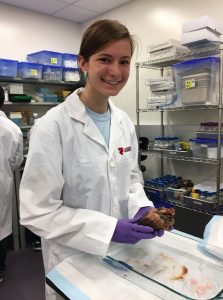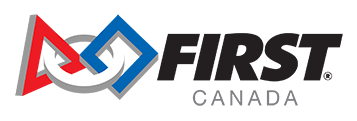
by Celeste Nantel
The FIRST programs are often appraised on the diversity of skills the students involved can learn. Design, Programming, Electronics, Manufacturing, and more, and that’s only the technical skills!
For the past three years, I have been a member of FIRST Robotics Competition (FRC) team 1360 Orbit Robotics. The conflict I faced was my interest in ALL of the different disciplines we learned on the team. This conundrum became a more pressing matter in my mind when nearing the end of grade 11 when I realized that soon I am supposed to apply for university. I knew my heart and my head were pretty set on engineering, but which field of engineering? Ah, well that’s the question. As the diligent scientist FIRST encourages us all to be, I decided to collect more data before theorizing what field of engineering is best for me. This is how I discovered DEEP Summer Academy run by the University of Toronto’s Engineering Outreach program.
The DEEP Program is the perfect opportunity to explore different options in the field of engineering. It offers a diverse range of pre-university engineering and science courses. For me to try to get the most out of this experience, I tried to pick the most “out there” courses that interested me, as well as offered me the opportunity to learn skills I could not learn as easily in FIRST Robotics. I took courses in Biomedical Engineering and Regenerative Medicine; Aerospace, Astrophysics and Space Transport; and Computer Engineering. Each of the courses was one week in length.
The course I enjoyed the most was Biomedical Engineering and Regenerative Medicine, which was a surprise for me since it’s the farthest from what I had been learning in FIRST. I was intrigued by growing embryotic stem cells to use concentrations of different protein cytokines and observed how the multipotent cells differentiate into germ layers. All of this happened in the University of Toronto’s cutting edge student laboratories. I also toured the Ted Rogers Centre for Heart Research and held a real pig heart in my hands! It was also a great opportunity to learn about what work is being done and how it takes people from all different fields: mechanical engineers, chemical engineers, biomedical engineers, biologists and medical doctors; who are all working together to try to achieve something great and help people around the world with new lifesaving treatments.
What was very interesting is how pursuing a mechanical engineering degree can still lead me to doing research in the biomedical field with designing machines for researchers as well as designing artificial organs and prosthetics, as just a few examples. We discussed and debated the ethical implications of the doors that biomedical engineering could open, as well as the process in Canada for treatments to go from the bench side to the bed side, and how to apply it to the biotechnology industry. Biomedical Engineering is definitely a field I would be interested in doing a minor in university or integrating that field somehow during my career journey if the opportunity arises.
The course in Aerospace, Astrophysics and Space Transport was interesting to learn about many new concepts For example, the propulsion fundamentals with Newton’s Laws, thrust equations, efficiency and performance, and the rocket equation. Also nozzle fundamentals with thermodynamic relations, gas dynamics, and shock waves, as well as thrust vectoring and nozzle cooling methods. Orbital mechanics was very interesting to me with gravitational forces and Kepler’s Laws and different orbit types. We also visited the University of Toronto Institute for Aerospace Studies which is a space flight laboratory. Of course, what is a course on rocketry without making and launching water bottle rockets! Unfortunately, many parts of the course were heavy in calculus (a class I haven’t taken in school yet since I had just finished grade 11) which somewhat had me lost at times.
In the Computer Engineering course we used logic gates with physical chips on a breadboard and virtually in machine code and using Verilog, and then interfaced it with hardware. We built up our code until we made a virtual CPU. We also programmed a race car that we built out of LEGO and simple motors and sensors. The Computer Engineering course was helpful in my quest to choose what field of engineering I want to pursue in university since I realized from this course that I did not like it and I definitely did not want to pursue it. Sometimes elimination is a more efficient way to find the right path…
Many aspects of my experience at DEEP were similar to those I experience in FIRST. Many of the projects and assignments were accomplished in teams of a few students which resembled working in subteams on an FRC team. I was always learning a new skill or a new theory which is similar to my experiences in robotics. I also met new people from all around the world. Students in my classes came all the way from Newfoundland, British Columbia, Washington, California, England, Israel, South Korea, China, and those are just the people I met there! I also met a group of students who are on an FRC team in Turkey! Much like in FIRST, STEM can bring people from all around the world together. All this, with familiar faces as well, like my friend Alex Hon from FRC Team 771 SWAT.
The University of Toronto’s DEEP Summer Academy has allowed me to explore a variety of the sectors of engineering in more depth; therefore allowing me to make an educated decision for my post-secondary path in correlation with where my passions lie. I have many difficult decisions ahead but I feel that with the exposure DEEP provided and with the supportive FIRST community having my back, I can look forward towards my future educational endeavors with confidence.
Celeste Nantel
Team 1360 Orbit Robotics
Dean’s List Finalist
